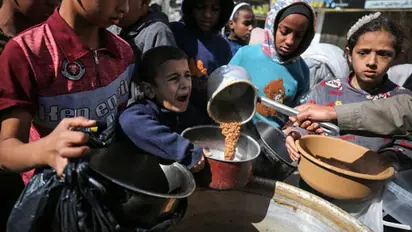Gaza's Grim Ramadan: Ceasefire talks stalled, worsening hunger, and shadows of unending conflict

Synopsis
As Ramadan marks the beginning in Gaza, the air is heavy with the echoes of stalled ceasefire talks and deepening hunger amidst the enduring conflict with Israel. International interventions aimed at peace face setbacks, leaving families to navigate the Islamist month against the backdrop of a fractured landscape and strained resources.
As Palestinians mark the beginning of Ramadan, the Islamic month arrives in Gaza against a backdrop of stalled ceasefire talks, deepening hunger, and the enduring five-month conflict with Israel. Despite attempts to broker a ceasefire by the U.S., Qatar, and Egypt, hopes for a resolution waned last week.
The war, which started in October, has taken a devastating toll, claiming over 30,000 Palestinian lives and leaving much of Gaza in ruins. Prayers were offered amidst the remnants of demolished buildings, with some attempting to bring a show of festivity to packed tent camps. However, the harsh reality continues with little to celebrate after months of conflict. Families, grappling with limited food options and soaring prices, find it challenging to observe traditional feasts during Ramadan.
Ceasefire negotiations sought the release of Israeli hostages and Palestinian prisoners along with significant humanitarian aid. Yet, talks hit a stalemate, with Hamas insisting on guarantees for a war-ending agreement, while Israeli Prime Minister Benjamin Netanyahu vows to pursue "total victory."
The war's toll extends beyond casualties, displacing 80% of Gaza's 2.3 million population and pushing hundreds of thousands to the brink of famine. Health officials report at least 20 deaths, mostly children, from malnutrition and dehydration in northern Gaza.
Israeli restrictions, ongoing hostilities, and the breakdown of law and order block humanitarian aid delivery through the road, compounding the humanitarian crisis in the region. The situation remains alarming as the public of Gaza navigates Ramadan amidst the shadows of conflict, hunger, and slowed diplomatic efforts.
Check the Breaking News Today and Latest News from across India and around the world. Stay updated with the latest World News and global developments from politics to economy and current affairs. Get in-depth coverage of China News, Europe News, Pakistan News, and South Asia News, along with top headlines from the UK and US. Follow expert analysis, international trends, and breaking updates from around the globe. Download the Asianet News Official App from the Android Play Store and iPhone App Store for accurate and timely news updates anytime, anywhere.